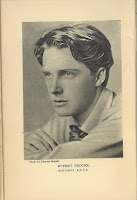In England, a literary journal titled The Bookman published an essay in its 1917 Christmas edition that listed the numerous English poets who had died in the conflict. The essay proved popular enough that, a short while later, the publishing company of Hodder and Stoughton issued a longer version in book form, entitled For Remembrance and complete with photographs of the deceased. The author and editor, A. St. John Adcock, provided a short commentary on each soldier-poet interspersed with quotations from that author's work.
 The first image the reader encounters, facing the title page, is a portrait of the poet Rupert Brooke by Sherrill Schell in 1913. The year after the image was taken, Brooke would enlist in the Royal Navy and, tragically, die of sepsis from an insect bite while on a ship in the Aegean Sea. The image of Brooke was likely chosen not only because he was very photogenic, but because his poem "The Soldier" – "If I should die, think only this of me:/ That there’s some corner of a foreign field/ That is for ever England" – was one of the most famous war poems of all time, and has become a symbol of the war’s early patriotic fervor.
The first image the reader encounters, facing the title page, is a portrait of the poet Rupert Brooke by Sherrill Schell in 1913. The year after the image was taken, Brooke would enlist in the Royal Navy and, tragically, die of sepsis from an insect bite while on a ship in the Aegean Sea. The image of Brooke was likely chosen not only because he was very photogenic, but because his poem "The Soldier" – "If I should die, think only this of me:/ That there’s some corner of a foreign field/ That is for ever England" – was one of the most famous war poems of all time, and has become a symbol of the war’s early patriotic fervor. This feeling of national pride and energy would famously dissipate over the course of the war as British losses mounted. Poets like Wilfred Owen and Siegfried Sassoon became the new voice of a generation that had grown disenchanted with the jingoism of its political leaders. One would be at a loss to find signs of this sea change in public opinion within the page of Adcock's book, however. He acknowledges that "there is too much gone that can never return" and states that "the soul of a nation lives in its literature." Curious, then, that there is no mention of prominent dissenting voices such as Owen, Sassoon, and others. Perhaps the wounds were too fresh for a nation still grieving its losses (and critical voices were too controversial for the publisher).
This feeling of national pride and energy would famously dissipate over the course of the war as British losses mounted. Poets like Wilfred Owen and Siegfried Sassoon became the new voice of a generation that had grown disenchanted with the jingoism of its political leaders. One would be at a loss to find signs of this sea change in public opinion within the page of Adcock's book, however. He acknowledges that "there is too much gone that can never return" and states that "the soul of a nation lives in its literature." Curious, then, that there is no mention of prominent dissenting voices such as Owen, Sassoon, and others. Perhaps the wounds were too fresh for a nation still grieving its losses (and critical voices were too controversial for the publisher).
To see For Remembrance, come to Special Collections and ask for Brooke 1.

No comments :
Post a Comment